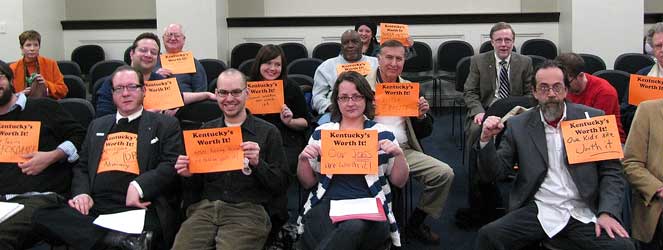Federal tax policy
 “We see a Kentucky that pays its bills and balances its budgets by accepting all the federal funds that we receive, and by raising our own state revenue in a fair and responsible way. I have seen is the impact that necessary functions of government have had on my life. We have an opportunity to build on these strengths that we’ve worked so hard for. This is the reality that we want to build on. It’s not only the right thing to do – it’s the smart thing to do. We all share a common future.”
“We see a Kentucky that pays its bills and balances its budgets by accepting all the federal funds that we receive, and by raising our own state revenue in a fair and responsible way. I have seen is the impact that necessary functions of government have had on my life. We have an opportunity to build on these strengths that we’ve worked so hard for. This is the reality that we want to build on. It’s not only the right thing to do – it’s the smart thing to do. We all share a common future.”
Greg Capillo
Lexington
The impact of the federal budget in Kentucky
For every dollar Kentuckians pay in federal taxes, we get back between $1.51 and $1.82 in federal investments, depending on which study is consulted.
An excerpt from a Lexington Herald-Leader article by John Cheeves (May 16, 2010) details the federal funds that help run Kentucky and our economy. Below is a partial list, using data from the U.S. Office of Management and Budget and other government agencies:
- Funding for flood insurance – $2.1 billion a year
- Mortgage insurance – $877 million
- Crop insurance – $667 million
- Food stamps – $674 million
- Veterans disability benefits – $478 million
- Pell Grants for 137,000 of Kentucky’s college students – $182 million
- Head Start for 16,000 children – $100 million
- Eighty percent of Kentucky's Medicaid costs are paid with federal funds.
Resources
Here are some national organizations that provides lots of information and resources on federal tax policy:
Institute for Taxation and Economic Policy (including a Kentucky page)
Center on Budget and Policy Priorities
Also, our friends at the Kentucky Center for Economic Policy track some reports that examine the federal budget implications for Kentuckians.
Some of our best opportunities for achieving a better quality of life for all Kentuckians – and some of our biggest threats against it – are the federal economic policies being decided in Congress.
Kentucky’s two senators and six representatives play a prominent role in these decisions. Sen. Mitch McConnell, as the minority floor leader in the Senate, and Rep. Hal Rogers, as the chair of the House Appropriations Committee, are in very public positions of power. Sen. Rand Paul, though in his first-term, is a dominant voice in the Tea Party wing of the Republican Party. Other House members have influential committee positions.
Through tax and budget policies, they are making major decisions affecting environmental protection, access to affordable education, health and wellness services, child nutrition and many other programs and priorities that affect every Kentuckian's opportunity to succeed. And since Kentucky's tax system largely mirrors the federal tax code, these decisions may also affect Kentucky's ability to raise the revenue we need on the state level.
KFTC members are making our voices heard in Washington, D.C. on federal economic policies that impact our commonwealth.

A community conversation with the Poor People’s Campaign: A National Call for Moral Revival
 On March 29, nearly a 150 people from across Kentucky and central Appalachia gathered in Harlan County for a community conversation with each other and with Rev. Dr. William J. Barber II and Rev. Dr. Liz Theoharis, as part of the national listening tour of the Poor People’s Campaign: A National Call for Moral Revival.
On March 29, nearly a 150 people from across Kentucky and central Appalachia gathered in Harlan County for a community conversation with each other and with Rev. Dr. William J. Barber II and Rev. Dr. Liz Theoharis, as part of the national listening tour of the Poor People’s Campaign: A National Call for Moral Revival.
Enough is Enough, Stop the GOP Tax Plan
KFTC is working for a day when companies and the wealthy pay their share of taxes and can’t buy elections. The Republican tax proposals coming out of Washington--from the person occupying the White House, from the House, and most recently from Senator McConnell's Senate--are deeply problematic.
The intent of these plans is not to fix a problem in our tax code, or even to reduce the national deficit. The intent of these plans is to cut taxes for the wealthy and corporations, and to make vulnerable the programs that so many of us depend on: especially Medicaid, Medicare and Social Security. The plans violate our values that tell us to be with each other in hard times and they undermine the role of our government. They are a scheme to dismantle our core democratic institutions, and we must fight them.
President proposes major new investments in Appalachian transition
The budget proposed by President Obama today calls for significant new investments in economic transition in Central Appalachia. The President's ideas for the region are being called the "Power + Plan."
Among the highlights of the President's plan are the following:
-
$1 billion over five years to restore lands and waters degraded by decades-old mining and support related sustainable development projects.
-
$56 million to invest in job training for laid-off miners and to support economic development efforts in Central Appalachian mining communities. This figure includes an additional $20 million in job training for miners and power plant workers; an increase of $25 million for the Appalachian Regional Commission's annual budget, to be directed at "communities most impracted by coal economic transition"; $6 million more to the Department of Commerce for "place-based regional innovation efforts," including grants to economically distressed communities; and $5 million more for the EPA's brownfields program to help communities deal with the closure of coal-fired power plants.
-
$3.9 billion over 10 years to shore up health and retirement benefits for many retired miners.
Today's the day to contact your federal rep about the Ryan budget!
The U.S. House is expected to vote on Rep. Paul Ryan's budget proposal today. Here are some resources for understanding the impact of Ryan's budget, along with numbers you can use to call in while there's still time!
New York Times interactive map of state and local business tax breaks
Kentucky spends at least $1.41 billion per year on incentive programs, according to the most recent data available. That's about 15% of the state's annual budget. According to their data, the oil, gas and coal industries are the top recipients of state and local tax breaks.
Page
- Home
- |
- Sitemap
- |
- Get Involved
- |
- Privacy Policy
- |
- Press
- |
- About
- |
- Bill Tracker
- |
- Contact
- |
- Links
- |
- RSS


